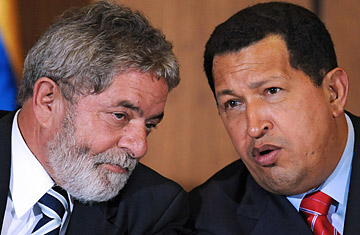
Venezuela's President Hugo Chavez (R) speaks with his Brazilian counterpart Luiz Inacio Lula Da Silva in Caracas.
The problem facing President Barack Obama in Latin America is that under the peevishness and negligence of his predecessor, the continent saw a stunning expansion of the anti-U.S. left. The solution to that problem may be Brazil's President Luiz Inacio Lula da Silva, who on Saturday becomes the first Latin American leader to visit the Obama White House — an invitation that all but anoints him as President Obama's liaison to the region. Smart choice, because the gravelly voiced former metal worker known simply as Lula has also publicly been given a "green light" from Venezuela's President Hugo Chavez, President Bush's leftist arch-nemesis in Latin America, to broker a rapprochement in U.S.-Venezuela relations. And it's been quite a while since Washington and Caracas agreed on anything.
By tapping Lula as a mutually acceptable go-between, Obama and Chavez could be opening the way toward mending U.S.-Latin America ties in general. U.S.-Venezuela relations suffered a major breakdown last year when both countries expelled each other's ambassadors; now they appear to be seeking to reestablish a dialogue. And that will likely buoy the mood at next month's Summit of the Americas in Trinidad, the hemispheric coming-out party for Obama. "This bodes well for U.S.-Latin America relations," President Lula told TIME. "We are all awaiting the new page President Obama has promised to turn." (See pictures of Sao Paulo's ad-free streets)
Lula, who has made his pragmatic brand of leftist politics as viable in his country's corporate boardrooms as it is in the favelas, or slums, is a logical interlocutor because he straddles the concerns of the continent's poor and those of economic growth. He may be the head of Brazil's Workers Party, but he's proven himself to be as much a capitalist as a socialist in his drive to modernize the world's tenth largest economy. "Lula's intellectual sensibility looks at people instead of political theories," says his foreign policy adviser, Marco Aurelio Garcia. And, like Obama, he's especially committed to market-driven green crusades such as biofuels. As a result, Lula, 63, carries more credibility inside the Beltway when he asserts that the U.S. has to soften its obsession with free trade and the drug war, and get serious for once about "a regional social and economic development agenda, which must be dealt with if long-standing U.S. security concerns [in the hemisphere] are to be effectively dealt with." Or, as he told TIME, "It isn't prudent for the U.S. to be so rich and surrounded by so many poor people."
But one issue on which Lula will likely admonish Obama is Cuba. The Brazilian, who last year spearheaded Cuba's inclusion in the Rio Group of Latin nations, insists that Washington needs to lift its 47-year-old trade embargo against Havana, which has failed to dislodge the communist Castro regime but has alienated much of the rest of the region. Obama this week did reverse Bush's tight restrictions on Cuban-American travel and remittances to the island; but he has said he favors maintaining the embargo, and Lula is expected to lobby him to reconsider during his White House visit.
Lula will also encourage Obama to improve dialogue with Chavez. At the same time, critics of Chavez and his regional allies hope Lula is pressing those leaders to recognize that their strident anti-yanquismo can be as gratuitous and counterproductive as the Cuba embargo. Chavez's endorsement of Lula playing a mediating role, which the Venezuelan leader announced last week during a speech in Caracas, is a sign that the Brazilian is having some success, says Michael Shifter, vice president of the InterAmerican Dialogue in Washington, D.C. "Chavez has been trying to get a grasp of Obama but just can't quite do it," says Shifter. "All the usual anti-U.S. indictments he's so skilled at aren't working as well as they used to."
While they may applaud Chavez's success in blunting U.S. hegemony in Latin America, many of the continent's leaders see Brazil, which has the region's strongest diplomatic corps as well as its largest economy, as their best bet for engaging Washington on more equal, and mutually beneficial, terms. Looking to Lula as the U.S.-Venezuela intermediary is "just another recognition of Brazil's role today," says Shifter. "It's asserting itself on all fronts." Indeed, Brazil has led recent efforts at Latin American economic integration such as Unasur, a South American counterpart to the European Union.
Despite his remarkable popularity at home (an 80% approval rating) and abroad, and his refreshingly unpretentious style, critics warn that Lula is prone to quixotic crusades for a permanent seat for Brazil on the U.N. Security Council and for an end to agriculture subsidies in the U.S. and other industrialized nations. They also argue that his failure to criticize Chavez and the Castros as forthrightly as he reproaches the U.S. hurts his standing as a hemispheric broker.
The stronger potential drawback to Lula's mediating role is that he has less than two years left in his final term as President. The Brazilian will almost certainly be long outlasted by Chavez, who just won a referendum that allows him to run for President indefinitely, and also by Obama. But even if he has just 22 months to teach the other two how to talk to each other, Lula remains the best bet to build a bridge between Washington and the Latin American left.
